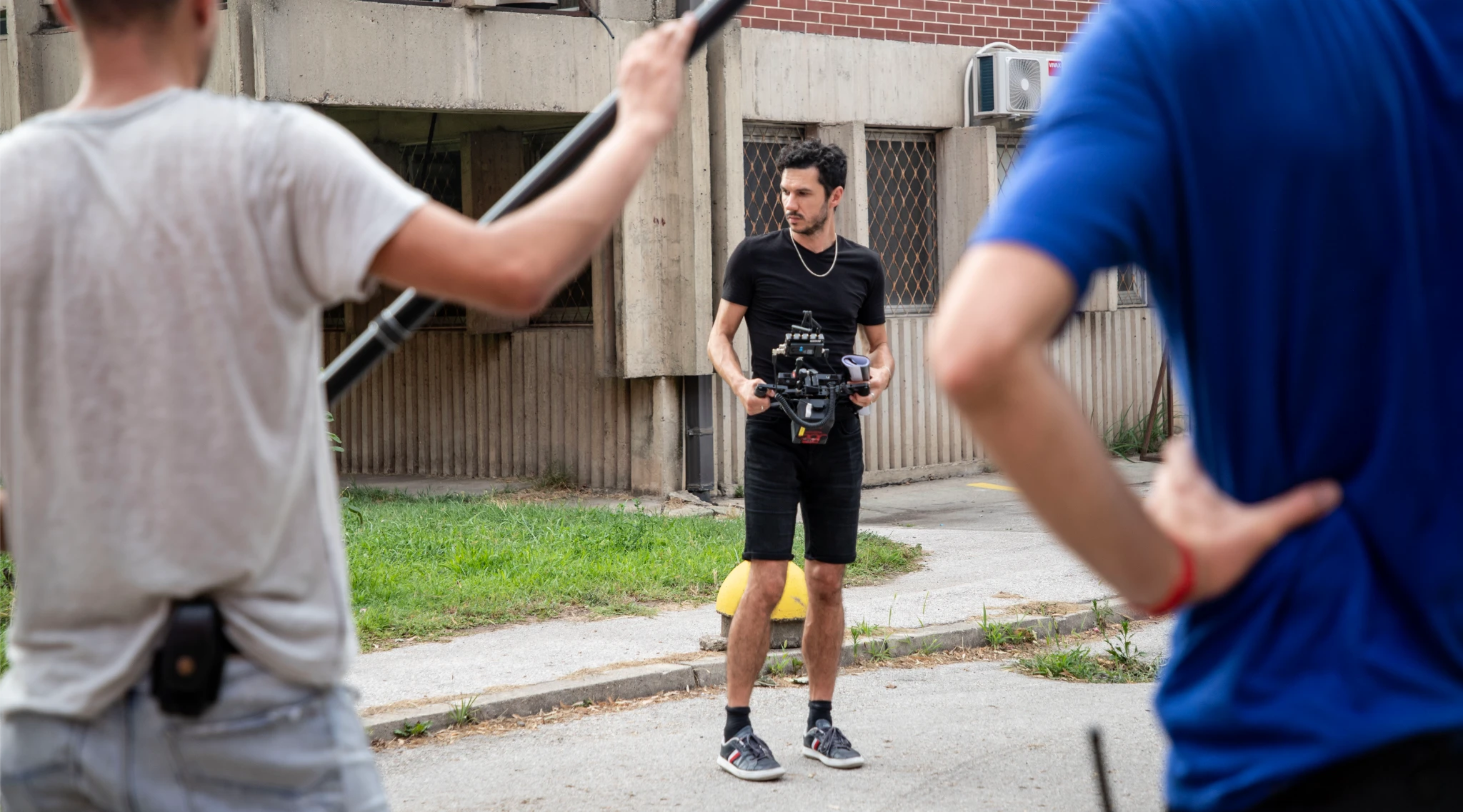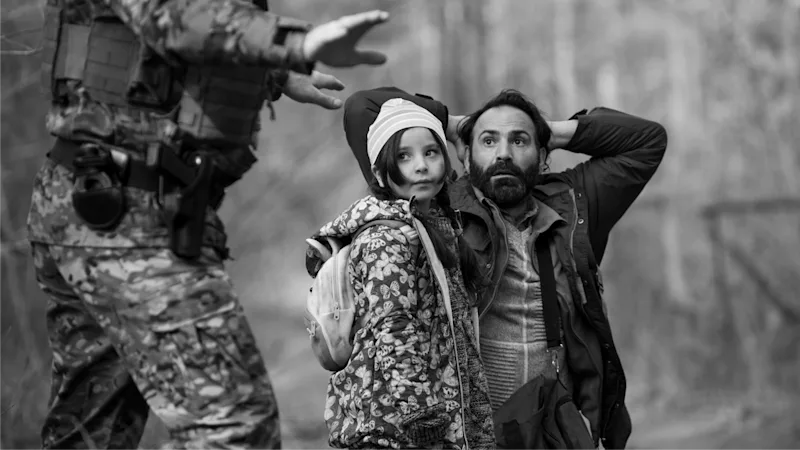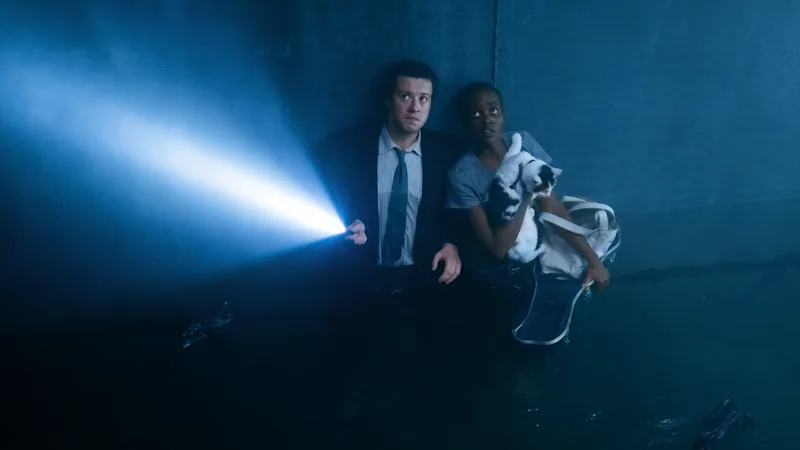A decade or so ago, Goran Stolevski was scrolling Facebook when he came across a photo posted by his friend, fellow Australian filmmaker Tony Ayres. It was a picture of Ayres and his partner in the late '70s, during a time when they shared a home with eight women, all of whom were also queer. Stolevski felt inspired to make a film within that world, which would ultimately become his latest feature effort, Housekeeping for Beginners.
"I always have to remind Tony, 'You know, it's inspired by your photo. It's because of you,'" Stolevski says with a laugh. "What's great is that he loved the film and connected with it for what it was, rather than just because it's about him."
To be fair, the photograph was only a jumping off point and Housekeeping for Beginners bears little resemblance to what might have actually transpired all those years ago. Stolevski's film is not a period piece but instead a family drama — or, chosen family drama — that takes place in the present day, and the writer-director has relocated the story from Australia to his birth country: North Macedonia.
At the center is Dita (played by Anamaria Marinca), a middle-age social worker whose partner, Suada (Alina Serban), is battling stage 4 cancer. Fearing for what will become of her daughters after her death, Suada forces Dita to agree to raise the girls — teenage Vanesa and little Mia — as her own. "Mama Dita" never wanted the title or responsibility, but circumstance soon finds her sharing a roof with Suada's daughters, as well as a handful of queer teens in need of refuge, her old friend Toni, and his latest dating app hookup.
Housekeeping for Beginners is Stolevski's third film in as many years. His feature debut came in 2022's You Won't Be Alone, a 19th-century folk tale about a shape-shifting witch. He followed it with 2023's Of an Age, a swooning coming-of-age story about a queer teenager who falls for his best friend's older brother. Housekeeping for Beginners premiered at the 80th Venice International Film Festival, where it won the Queer Lion.
"Shooting three films back to back very quickly, it does things to your brainwave patterns, so you get addicted to these enormous operations that require doing 800 things at the same time and taking care of a whole world of people that is fictional, and then a world around them with people that are very much not fictional," Stolevski tells A.frame. "I'm now addicted to the adrenaline that comes with that. The next two I want to make are written, and the two after that, I've got the ideas now."
A.frame: This is your third feature in three years. What's the secret to working so prolifically?
Being a failed filmmaker for 20 years before you get your first shot. In my case, just to survive on a day-to-day level, I had to bury all my anxieties and fears for my future into a story world that eventually grew into a screenplay, and then that screenplay would inevitably get rejected and not really read by anyone. And then to absorb that state of rejection and anxiety, I would move on to a whole other story and write that. And I did that. I had written 13 features before I made my first one. So, when I suddenly became a temporary hot property and people asked me, "Do you have a feature?" I was like, "Here's one, and here's another one, and here's another one! Let's go!" And I'm in that situation again, because those three are now done and now we're in the process of putting together the next few. That's my advice: Bury your anxieties in your writing."
Moving from one project to the next to the next, what did you learn on those first two that you built on here? Or was there a lesson from Of an Age that proved invaluable to Housekeeping?
It was actually really useful that I had just been editing Of an Age. Because a lot of a film comes together in the edit and I'm literally the editor of my films, so a lot of direction happens in that. Directing is not really telling people what to do — because you don't have that much control — but you create an environment and hope things come together as well as they can. And then in the edit, you're shaping the emotional throughline for the viewer, as well as the characters on the screen, obviously. Having just edited Of an Age and going straight into Housekeeping, it was remembering the little bits of like, "Oh, I wish I had done that." All of the little details and transitions you need to build into a movie to keep that emotional journey smooth for the viewer and to keep them connected to the characters. Sometimes it's not very straightforward, so that was hugely helpful.
And then Of an Age had a lot of music, not all of which was planned. It came from the edit. And it wasn't about covering things or compensating for them, but it gave me a chance to build on top of the story and the experience that was already there. It was about how much more could happen. So, thinking of that on set with Housekeeping, I built in a lot of the singing scenes. They weren't actually in the screenplay. I was improvising them with the cast as we were going along, knowing what kind of energy that gives the film. And I wanted this film to have a lot of energy. I didn't want it to be European miserablism. I wanted it to feel like life, which has all emotional shades — not just extreme darkness or extreme joy.

I know the first kernel of an idea was the photo you saw of your friend and his housemates and your wanting to be in that space. There could have been a more obvious version of this, where it's centered on a character like Ali coming into the house. That's part of the story, but how did you come to the story of Dita and Suada, which is the true heart of the movie?
The characters of Ali and Suada were the first ones that came to me. They were just an energy before they were people. I don't know at what point I decided that they would be Roma. Ali was vaguely inspired by someone that I very vaguely knew, so a lot of it is fictional creation, but it came from somewhere. And then Suada comes from my stubbornness a lot of the time and going, "But why do I have to do that? I know everyone's been doing this all these years, but why do I have to do that now when we all know it's wrong?"
A lot of the time when I see myself in a character — not just the ones I've written but even when I'm watching something and connect to someone very intensely — it's always a discovery for me to find out afterwards. That character is allegedly an unlikable woman, so I think on the inside, I am an unlikable woman. But all my films are pretty much my brain split between two people. In the first case, it's a couple of witches. In the second case, it's a bunch of gays in Melbourne. And in this case, it's my brain split between Dita and Suada to start with, and then it becomes Dita and Vanessa, who are stubborn in different ways. That's the jumping point. And all of this is happening very instinctively while I'm writing. I don't really write from an intellectual or cerebral place. I write from instinct and then shape things according to what makes sense to me rationally, but I never start from somewhere rational.
You set the film in Macedonia and returned to shoot it there. As a queer filmmaker, what does it mean to be in your home country making a movie about queerness, knowing all that that entails but also what it could mean to queer Macedonians watching the film?
Look, it's complicated, especially when we were prepping it and I didn't really know how the days would run once we were on set. I'm very lucky when I go there, because I'm now from the West to them. I'm not seen as as much of a danger to the children, and the way bigotry works is there's always, "Oh, he's one of the good ones," or "she's one of the good ones." There's always that limited amount of people that the bigotry doesn't apply to who can slip under the radar or above the radar. In a lot of ways, I've managed to do that. And when I go to the capital city, to Skopje, I end up just hanging around either very self-selected circles or the art circles, where you can go into a room and the chances of me sustaining brain damage because I committed to sleeping with men from a young age are lower than average. So, I manage.
And then I prefer when there's a lot of women on the crew, because I think it minimizes toxicity on set. Also, I think things just get done. I'm very conscious of that, and not just in Macedonia. I think that created a great atmosphere on this set, and I didn't have to impersonate a macho guy to give off a sense of leadership or whatever. Just doing the job and having ideas and having solutions was enough. Ironically, there were also more queer people on set in Macedonia than there were on Of an Age, so it was lovely, actually.

Your films feel so alive. Every scene is bursting with life, and the performance feel so lived in and real. In terms of how you like to lead a set, what is that vibe you are creating to capture that energy?
Well, I plan things obsessively. There is that. I shot list and plan and plan and plan, and then on the morning of filming, I get rid of the shot list and the plan and I go, "What's in front of me? What have we got, and how do we shape this into an interesting scene? And what other things have I not thought of that I can build on top of that?" There's what's written, and then I try to shift the character to more resemble who the actor is in real life — to take in their natural mannerisms and personalities and build on top of what's written — and encourage them to improvise. Ironically, the more you give actors freedom to improvise, the more they end up sticking to the script, but they take it at their own pace rather than feeling pressure to just hit marks. And then there are little moments in between that they give you that are golden presents. Sometimes it's not even something that will go in the scene we're filming. It's something that I can extract and put somewhere else later on.
But a lot of the time when I'm directing, I'm not thinking about what the final image is going to be or what it's going to look like or sound like. It's about creating an energy on set so that everyone feels very connected to everyone else, everyone's very clear about why we're doing what we're doing, and everyone feels very free to do what's written or do things on top of that. And a bad take is not the actor's fault; it's my fault. I think when someone doesn't feel pressured, they can bloom in a way and give you things that you don't get to write. There are things that are hard to put into words but a particular face expression or a look — I look out for those things. I also have great people to work with that make me feel supported and like a part of something bigger. I never feel like I'm the director. I feel like the film is the director, and we're all serving it.
Getting that sort of naturalistic performance from an adult actor is difficult. I was blown away by what you got from the actress [Džada Selim] who plays Mia. How did you work with her?
You don't direct a 5-year-old, she directs you, and you should be so lucky that she's giving you the time of day, frankly. And we didn't cast Mia because she was someone who follows instructions; we cast her because she had the fire in the eyes. She's Bette Davis in the shape of a Macedonian 5-year-old, as far as I'm concerned. So, whatever she does, that's the movie. It was actually great in the sense that to her, it was just like the role play she does with her toys. And again, because for me, directing isn't about getting that final moment, it's about creating the ingredients and hoping they all kind of come together, that means there's a lot of freedom and flexibility and we prioritized her and whatever she would do.
Firstly, we had to create a set every single day anew, where she wanted to spend time. We knew we had about five minutes before she was just like, "I'm done." There was a little bit of psychological manipulation, as well, in the sense that if she didn't feel like doing something, I would start shooting another girl on set and then she'd be like, "I want to do it!" And I'm like, "Oh, well, if you want..." We also realized she likes popping balloons. So, there were balloons everywhere. There are those tricks, and then you go with what she gives you. I mean, I do that with all actors, including grown-ups, whether they be trained actors or non-trained. The principle is always to make every scene feel like it was found or discovered, rather than staged. You hope it works out though! [Laughs] That's about it.

Your films have ventured out further and further into the world. What has it been like to see so many different people from so many different places react to them?
Oh, that's the gift. You dream of the day when you finally make a feature — much less make several — and you go, "What is that going to feel like? What is that going to be?" And it's not been anything like what I anticipated in most ways. And, again, I'm a fan of working with what's there, so I go, "What are the things that give me life, that give me the desire to keep going at this often very punishing job?" And I remember being in Venice, actually, for the premiere of Housekeeping and there were a few people, mainly young Italian film fans, waiting outside to meet me, which already was surreal. I still remember a girl called Angelica I met. She traveled all the way to Venice because she loved You Won't Be Alone so much, and she wanted to meet me and tell me that. I hugged her and she cried, and then I cried, and everyone started crying. Those are the moments.
I still kind of feel like I'm toiling away in obscurity in a way that I don't think is bad. I still feel like there's a niceness to this kind of obscurity as well. I'm in New York at the moment for work. And yesterday, I was in a café in Manhattan, and someone named Owen came up to me because they recognized me and they loved Of an Age so much. This isn't someone who's related to me by blood, and therefore it's mandatory for them to like it. But they told me they watched it immediately two times in a row the first time they saw it. That's what makes it worth it. It also makes me more stubborn, but I think in a positive way. I'm not going to do the studio movie that will give me a nicer apartment. I'm not chasing the feeling of having a two-bedroom apartment instead of a one-bedroom. I'm chasing the feeling of finding Angelica or Owen again in whatever shape or form, because that's what gives meaning to me.
Earlier, you mentioned that you're not just working on putting together your next film but your next few films. When do you rest?
I try not to if I can help it. Especially now, shooting three films back to back very quickly, it does things to your brainwave patterns. You get addicted to these enormous operations that require doing 800 things at the same time and taking care of a whole world of people that is fictional and then a world around them with people that are very much not fictional. I'm now addicted to the adrenaline that comes with that. And I struggle with holidays. I'm going on a holiday, actually, but I'll probably be writing a lot. I end up doing a lot of my writing while I travel. The next two films I want to make are written, but the two after that, I've got the ideas now.
By John Boone
RELATED CONTENT:
'Housekeeping for Beginners' Director Goran Stolevski's Top 5
Julio Torres and Tilda Swinton Discuss the Subversive Surrealism of 'Problemista' (Exclusive)
Pride Movie Guide: 30 Films By, For and About the LGBTQ+ Community







